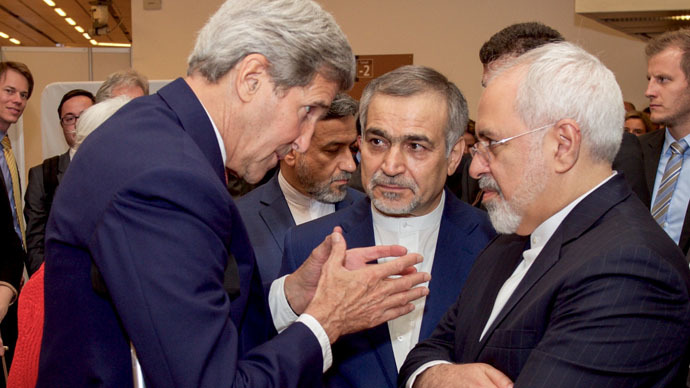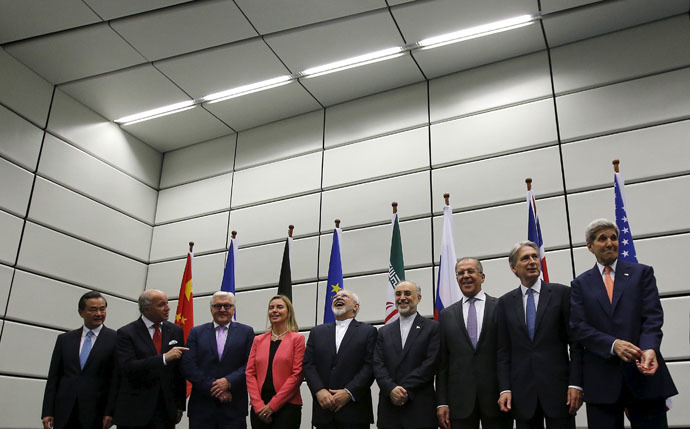'Can’t accuse Iran forever if your information is not good' - former IAEA inspector

The IAEA will have no problem monitoring uranium production in Iran, the problem will come when the agency is asked to look into things where they have no expertise like explosives, detonators, missiles, says former IAEA inspector Robert Kelley.
According to the nuclear agreement achieved in Vienna on Tuesday Iran agreed to limit the enrichment of uranium for the next 15 years and allow monitoring of its nuclear sites for 25 years in exchange for the lifting of economic sanctions after international inspectors confirm it's complying with the deal. The arms embargo against Tehran will remain in place for five more years and all sanctions can be snapped back within 65 days if Iran violates the agreement.
But it seems that not everything has been agreed upon by the sides. Under the road map “for clarification of past and present outstanding issues” Iran still has to provide written explanations about any issues raised by the 15th of August. The International Atomic Energy Agency (IAEA) then has to review them and table any questions. The whole process should be wrapped by mid-autumn with a final IAEA assessment by the 15th of December.
RT:We understand there are some outstanding issues from the past and present which remain unresolved. What are they?
Robert Kelley: I think in the nuclear materials issues there are essentially no unresolved issues. They’ve dealt with the centrifuge program, with the quantities of uranium and the plutonium program. All those things are in very good condition. There are issues where people have provided anonymous tips that Iran was doing less-than-so in the nuclear weaponization area; those are not terribly credible and they have been kicked around for four-five years without any resolution.
READ MORE: Key points of historic nuclear deal reached by Iran and 6 world powers
RT:If the parties haven't managed to overcome them before how will they do so now?
RK: I was concerned about that too. The Director General of the IAEA put out what he called a ‘road map’ [on Tuesday] and it looked remarkably like a road map that they put out a year ago and two years ago, saying that they agreed to sit down and answer questions. The real problem I think it comes down to is that many of the things that the IAEA is accusing Iran of doing, Iran is saying: “We didn’t do those things so we can’t answer your question.” They can’t say “I’m not beating my wife anymore, because I wasn’t beating her in the first place.” So the IAEA is going to have to decide at what point they realized that Iran’s answers are more truthful than the information that they are accusing them of. That sounds bias, but… you can’t keep accusing somebody of something forever if your information is not good.
RT:It's now down to the IAEA to monitor the implementation of the deal. Do you think the group's in any position to do that, does it have the resources needed?
RK: The IAEA will have no problem at all monitoring uranium materials, the production of uranium, the chemistry, the shipping of uranium abroad, which Iran has agreed to do. They will have no problem with the plutonium reactor that Iran is going to destroy portions of. That’ll be easy. The problem will come when the IAEA is asked to look into things like high explosives, detonators, missiles, things like that where they have no expertise and they have no historical mandate. In the last 50 years they haven’t done those things and so for them to suddenly become experts in those areas I think is impossible. That’ll be a problem. But look at that from another point of view - that’s about weaponization of uranium and plutonium, which the IAEA is going to be able to say they don’t have. So if don’t have the uranium and plutonium, weaponization becomes a problem.

RT:Is there a feeling that the world powers have simply passed the buck here to the IAEA? Could they then blame it if anything goes wrong?
RK: That’s an interesting question. I haven’t heard it phrased that way before. Again when it comes to what the IAEA does normally, which is account for nuclear materials and make verification measurements, auditing processes, I don’t think there is any problem with passing it to the IAEA. They were already doing it in small measure for the last ten years and almost every day for the last year and a half. When it comes to the other issue, you’ve raised an interesting point. I wouldn’t have phrased it that way, but the IAEA box themselves in by publishing a lot of accusations that they can’t sustain, some stuff that is really garbage and now they have to kind of back down from some of their claims. For example they say that at a place called Marivan, Iran did some really big experiments for making nuclear weapons and Iran offered to take them there three times and they always say: “We don’t want to go because we don’t really know what it was we accused you of”.
RT:The US seems to feel inspectors will have completely unfettered access to all of Iran's sites deemed suspicious, whenever they want. Will it really be that that simple, or does it have a potential to become a major problem of this deal?
READ MORE: Skeptics, snapbacks & Netanyahu: How Iran nuclear deal could still be derailed
RK: I think it’s a major problem. The IAEA could go on fishing expeditions and act as intelligence agencies for other people. I don’t think Iran is going to allow that. Also, you have to kind of wonder about that word ‘suspicious’. It’s appeared in a number of press releases in the last year. What is a suspicious facility? Facilities are usually not suspicious, they don’t suspect. So you are in a position of saying “it’s in the eye of the beholder,” and I think the Iranians are going to be in a very good position to say to the IAEA: “Why do you want to go to this university? Why do you want to visit the faculty of physics? Why do you want to go to this military factory where we are making missiles, which has nothing to do with you?” So the word ‘suspicious’ is a suspicious word, I’m sorry, it’s fraught with non-specific meaning.
RT:If you've managed to glance at most of the document from today what's your impression? Is it really the win-win that is being talked about? Did anything stick out to you that could well become a problem?
RK: It’s a win-win for the most part. It’s good for the IAEA 3+3.It’s good for Iran. It’s really good for Israel, they just have to wake up and understand that. But the only thing I could see in it if I were trying to sell this to the American Congress, the fact that British and American inspectors are excluded from inspections will be a bit of a hard sell, that’s unfortunate. And I hope Iran will reconsider on that and say it would be to their advantage to let people in who represent states with the biggest problems with them.But generally I don’t see too many things in the agreement that look like a problem and it doesn’t look all that different from what was agreed to in Lausanne back in April.
The statements, views and opinions expressed in this column are solely those of the author and do not necessarily represent those of RT.
LISTEN MORE:
The statements, views and opinions expressed in this column are solely those of the author and do not necessarily represent those of RT.












